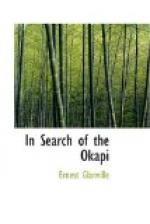“They’ll keep,” said Mr. Hume. “When the old world gets tired, worn out, and over-populated, it will find use for these big, silent, deserted rivers, that would carry the ships of the world on their yellow waters.”
CHAPTER IV
THE STORY OF MUATA
They went from the wide estuary into the true river, with a width that opened out at times to twenty miles; and while the white men sweltered on the sticky decks, the rescued man grew in strength. When they reached Stanley Pool his skin was like satin again, with a polish on it from the palm-oil he rubbed in continually.
And when he found his strength he found use for his tongue, and in the speech he made to his rescuers. Mr. Hume caught the meaning of a few words of Bantu, Compton detected a phrase or two in Arabic, and Venning, who had been schooling himself since they passed Banana Point at the river mouth, picked out other words in the tongue of the river tribes.
The meaning of his speech, when they had made a mosaic of the different understood facts, was this—that he was a great man in his own land, but only a child now, being without arms or men, but that if the white men ever came to his place, he would be a father and a mother to them. He would throw his shield before them, and protect them with bow and spear.
After this they sat together learning a polyglot speech that would serve roughly as a medium of exchange.
And this was the story of the chief, slowly put together out of these talks—
“I am Muata the chief. The kraal of my house is toward the setting sun, but the fire no longer burns on the hearth. The men-robbers fell upon the place in the early morning. The people were scattered like goats before the lion. Many were taken by the men-robbers, and many were slain; and among them my father.
“The chief’s wife, my mother, fled with me into the Great Forest. Many days she lived on roots, and the ‘little people’ found her in her wanderings. They took her by crooked paths far from the land of her people. Ohe!
“Through the dark woods—through the dark and terrible woods, through the mist and the rain, with much pain, she followed them as they went before her like shadows. And in the folds of her blanket she bore me on her back. It is true.
“She was straight as the palm when she fled from the kraal, and when after long journeying she set me down at the hiding-place, she was thin and bent. Thin and bent was the chief’s wife, she who had maidens to wait on her.
“At the hiding-place in the forest there were people whose kraals had been burnt by the men-robbers. Outcasts they were, of many tribes, living together without a chief; but the place was fat, and they grew fat, being without spirit.
“And Muata the child played with other children and grew. He grew on the fatness of the land, and when he could walk, his playmates were the young of the jackal; his playthings were the bow and the spear.




